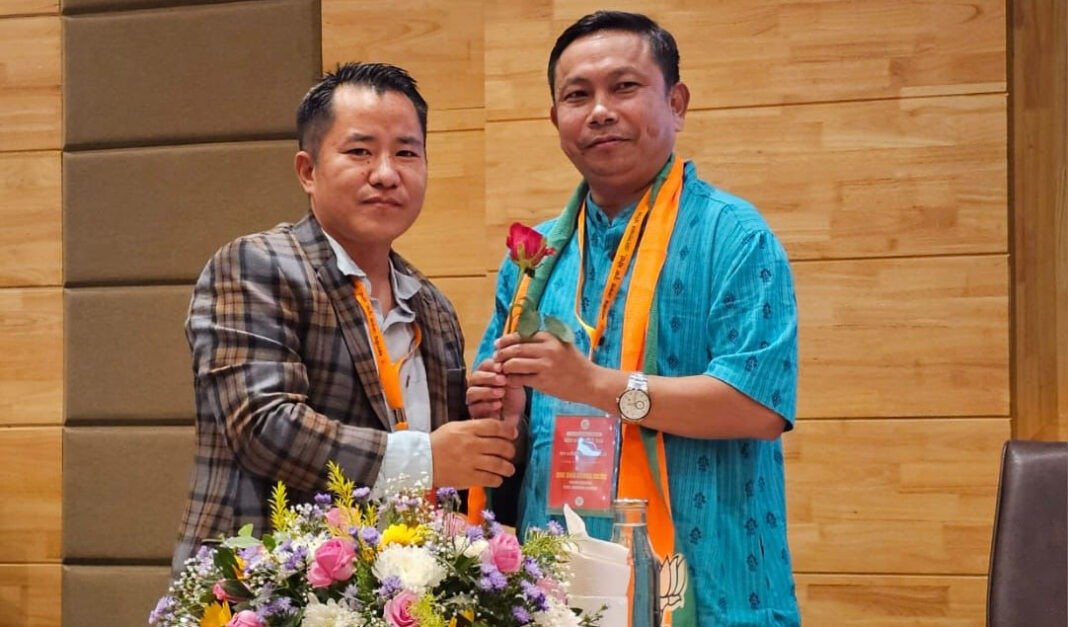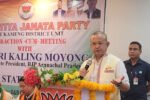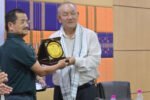HT Bureau
NAMSAI, Aug 25: In what is being seen as one of the most notable political realignments in Arunachal Pradesh this year, Chow Ambika Enling, a senior and widely respected political leader from Namsai district, has officially joined the Indian National Congress (INC).
Enling’s decision to part ways with the Bharatiya Janata Party (BJP), after a long and distinguished career spanning more than 25 years, is being closely watched across the state’s political landscape for its immediate and long-term implications.
Chow Ambika Enling is regarded as one of the most experienced and grassroots-connected figures in Namsai.
He entered politics in 1998 as a member of the Bharatiya Janata Yuva Morcha (BJYM), the youth wing of the BJP.
Known for his discipline, organisational skills, and popularity among the younger generation, he quickly rose through the ranks and, within just two years, became the State General Secretary in 2000.
His appointment to this key position reflected the trust placed in him by the party leadership and marked the beginning of a long journey in party affairs, electioneering, and grassroots mobilisation.
Over the years, Enling became synonymous with the BJP’s rise in eastern Arunachal.
He was at the forefront of numerous organisational drives and election campaigns.
In 2008, he was entrusted with the important task of overseeing the Assembly Constituency election campaign in neighbouring Mizoram, where he played a pivotal role in mobilising support.
His work during that period earned him recognition not just in Arunachal but within the wider regional unit of the BJP.
In 2009, Enling took a major step in his career by contesting the Arunachal Pradesh Legislative Assembly election from the 47th Namsai (ST) constituency on a BJP ticket.
Though he narrowly lost, his candidacy reinforced his stature as one of the key faces of the party in the district.
Following the election, he remained deeply engaged with grassroots politics, building networks of support, addressing local grievances, and representing the aspirations of the people of Namsai at the party level.
Despite his long years of service, Enling grew increasingly disillusioned in recent years.
The turning point came during the run-up to the 2023 Assembly elections, when the BJP denied him a ticket for the 48th Lekang constituency.
Many of his supporters and well-wishers considered this a setback not only for him personally but also for the larger section of grassroots workers who had looked up to him as their leader.
For Enling, the denial of a ticket after decades of commitment was a signal that his services were no longer being valued.
Announcing his decision to join the Congress, Enling said, “I have dedicated my life to serving the people of Arunachal Pradesh and to strengthening the BJP for more than 25 years. But in recent years, I was not given the opportunity or importance that I had earned through my work. Politics, for me, has never been about positions or privileges. It has always been about service to the people. The Indian National Congress has assured me that I will have the right platform to continue this mission with renewed vigour, and that is why I have taken this decision.”
The Congress leadership has warmly welcomed Enling into its fold, hailing his entry as a morale booster for the party in Arunachal Pradesh.
Senior leaders pointed out that Enling brings with him not only a wealth of political experience but also a strong connect with grassroots voters in Namsai and adjoining districts.
They believe his move will bolster the party’s presence in eastern Arunachal and provide much-needed momentum as the INC seeks to regain lost ground in the state.
Political observers say that Enling’s defection highlights deeper undercurrents within the BJP in Arunachal Pradesh, where several senior leaders have in recent times expressed dissatisfaction over lack of recognition and opportunities.
The BJP, which has enjoyed a dominant position in the state in recent years, has often been accused by its detractors of sidelining experienced leaders in favour of newer entrants or leaders perceived to be closer to the central high command.
Enling’s decision to quit the party, they say, may not be an isolated case but part of a larger trend that could influence the political balance in the region.
For the Congress, which has been struggling to re-establish itself in Arunachal after successive electoral setbacks, Enling’s entry could not have come at a better time.
His presence is expected to strengthen the party in Namsai, where local leadership plays a decisive role, and may also inspire other veteran leaders to consider aligning with the Congress.
With his knowledge of electoral dynamics and his grassroots network, Enling is likely to play a key role in strategy building and mobilisation in the months to come.
Political analysts also note that his decision reflects the personal and community-driven nature of Arunachal Pradesh politics, where individual leaders often carry significant weight in shaping public opinion and influencing electoral outcomes.
While party labels are important, voters in many constituencies are guided by their faith in leaders who have consistently worked for their welfare.
Enling’s decades of association with the people of Namsai, his active role in addressing local grievances, and his accessibility as a leader have all contributed to his popularity — factors that the Congress will now seek to leverage.
As Arunachal Pradesh heads towards another crucial electoral cycle, the shifting loyalties of experienced leaders like Chow Ambika Enling will continue to shape the political discourse.
Whether his move to the Congress results in a decisive strengthening of the party’s position or merely adds a symbolic boost remains to be seen.
What is certain, however, is that Enling’s defection underscores both the evolving nature of politics in the state and the continuing importance of grassroots leadership in shaping its future.
With this development, the political equations in Namsai stand altered. For the BJP, losing a leader of Enling’s stature is a setback, while for the Congress, it represents both an opportunity and a statement that it remains open and welcoming to seasoned leaders who feel left out elsewhere.
For the people of Arunachal Pradesh, Enling’s move is being seen as yet another reminder of the fluid and competitive nature of state politics, where leadership, loyalty, and opportunity often intersect in unpredictable ways.












